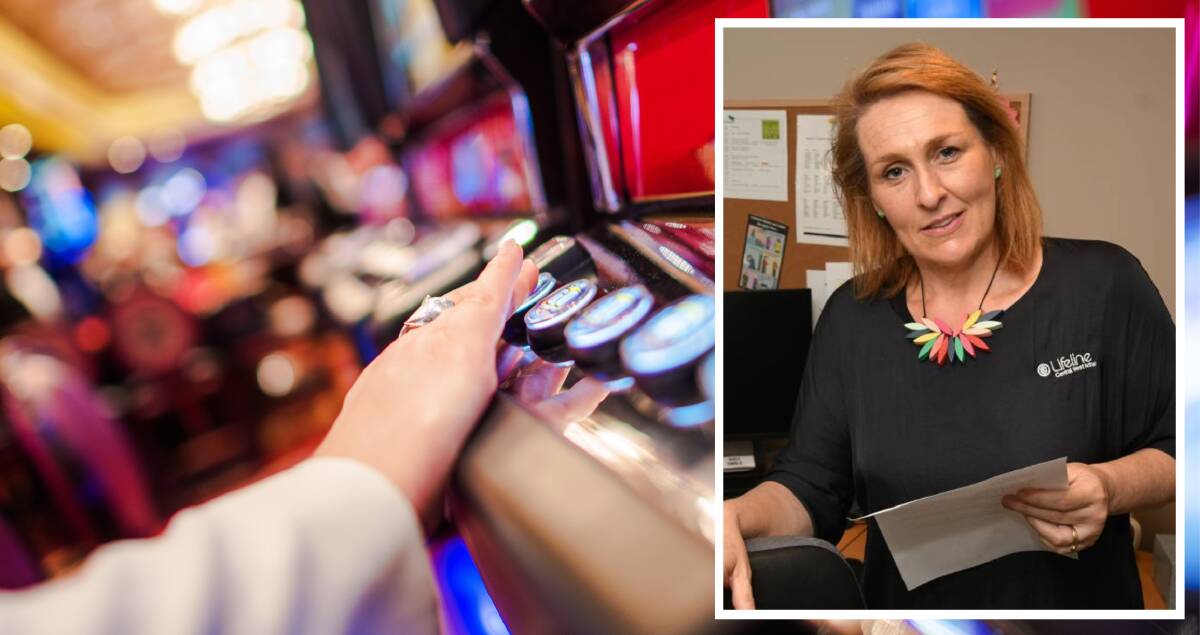
Gambling counsellors across the central west report seeing a "high number" of people presenting with concerns about gambling addiction, says Lifeline Central West CEO, Stephanie Robinson.
Subscribe now for unlimited access.
or signup to continue reading
"I think everyone can recognise gambling addiction is a problem and it can lead to a whole host of other issues around relationship breakdowns, a decline in mental health, financial distress and homelessness," she said.
"And when it gets really bad it can even lead to suicide."
In the past calendar year, Lifeline Central West's counsellors report having "just shy of 2,700" interactions with people concerned about problem gambling - a large percentage of these, Ms Robinson says, are people who are addicted to poker machines.
There have also been a growing number of third party referrals or information gathering calls from people concerned about clients or family members' gambling habits.
"They've identified that a client or someone in their life has a really big issue and they want to know how they can support them," she said.
"We're also being asked to do more presentations and work with groups because it is being recognised that gambling is having a really big impact in all different areas - even starting with young people and the games that kids are getting addicted to."
Ms Robinson said the design of poker machines can make them an "incredibly dangerous activity", particularly some of the most vulnerable in our community.
"They're designed to create these neurological pathways in people's brains around the whole reward system. The sounds, the bright lights, the noises - we're all addicted to that hit of dopamine," she said.
"They get drawn into it and often without realising become more and more addicted to it. "
According to the latest data published by Liquor and Gaming NSW, punters within the Dubbo Regional Council area lost just under $24 million to poker machines in six months.
Between December 2021 and May 2022, more than $13 million was put into pokies at clubs, and, from January to June 2022, just under $11 million was put into pokies at local hotels.
Ms Robinson said while most people who use pokies are not problem gamblers, those losing the most money were often vulnerable members of society who can least afford to lose it.
"People might have had a win before and could find themselves in a situation where they think 'I've won before, maybe that's the answer'," she said.
"The root of most peoples' addictions are pain. It's a maladaptive way of trying to cope with that pain and then they're exposed to a mechanism that's incredibly addictive and it's a very difficult pathway to get out of and the odds are not stacked in their favour."
"And it's often the ones who can least afford to play are the ones playing."
In an effort to combat problem gambling some leading charities and anti-gambling advocates have called on the NSW government to introduce cashless gaming cards and spending limits.
"Speaking to some of the gambling counsellors they feel the cashless card would be really beneficial, particularly in some of those lower socio-economic communities," said Ms Robinson.
With a state election fast approaching, gambling reform has become a key talking point for both major parties.
While premier Dominic Perrottet has backed the idea for cashless gaming, member for Dubbo Dugald Saunders said the coalition was still in discussions about the issue and will "work with industry to fix the problem while protecting jobs".
Ms Robinson agreed clubs play an important role in the community and said all stakeholders should come together to be a part of the solution.
"Clubs provide such a pivotal role in so many small communities - wherever we work it's often clubs who welcome our training and allow us to use their spaces for no charge," she said.
"They're the places people go because it's warm in winter and cool in summer and they have reasonably priced meals.
"We really do have to think of ways for everyone to come together and get understanding from all stakeholders involved - the clubs, both sides of government and people with lived experience - because it's certainly a large problem."
Support is available for those who may be distressed.
- Phone Lifeline 13 11 14
Our journalists work hard to provide local, up-to-date news to the community. This is how you can continue to access our trusted content:
- Bookmark
- Make sure you are signed up for our breaking and regular headlines newsletters
- Follow us on Twitter
- Follow us on Instagram
- Follow us on Google News

